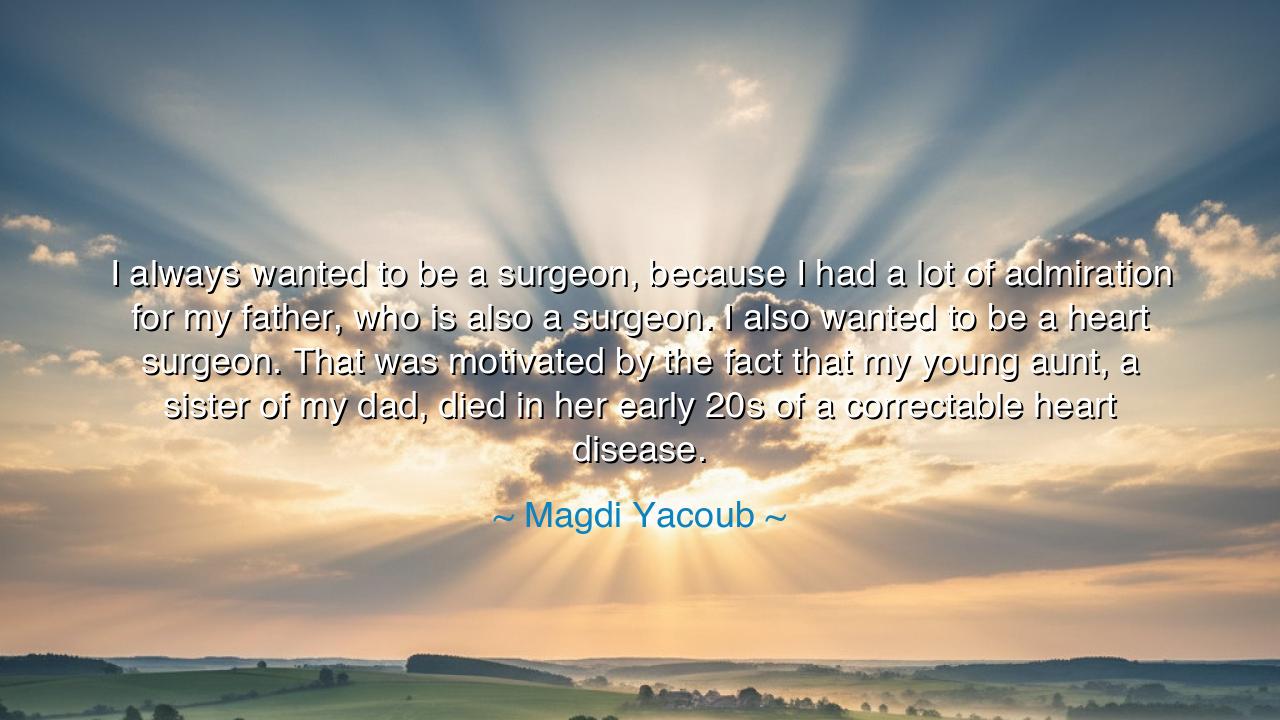
I always wanted to be a surgeon, because I had a lot of
I always wanted to be a surgeon, because I had a lot of admiration for my father, who is also a surgeon. I also wanted to be a heart surgeon. That was motivated by the fact that my young aunt, a sister of my dad, died in her early 20s of a correctable heart disease.





The words “I always wanted to be a surgeon, because I had a lot of admiration for my father, who is also a surgeon. I also wanted to be a heart surgeon. That was motivated by the fact that my young aunt, a sister of my dad, died in her early 20s of a correctable heart disease,” spoken by Sir Magdi Yacoub, are filled with quiet reverence, sorrow, and destiny intertwined. Beneath the humility of his tone lies the sacred fire that has driven healers since the dawn of civilization — the merging of love, grief, and purpose into one path of service. In this confession, Yacoub reveals how admiration and tragedy joined hands to guide him toward his life’s calling. His dream was not born of ambition, but of compassion; not of pride, but of a promise to life itself — to save others where one life could not be saved.
To admire one’s father is to be drawn toward the light of example. Yacoub’s father, himself a surgeon, did not merely teach skill — he embodied the moral gravity of the healing profession. In the eyes of the young Magdi, the operating room became a temple, and the scalpel, a sacred instrument of mercy. Through his father, he glimpsed a world where intellect served humanity, where knowledge could defy death. This early admiration planted the seed of purpose, but it was grief that watered it — the loss of his aunt, so young, so full of life, taken by a “correctable heart disease.” In those words — correctable — lies the pain that changes destinies: the unbearable knowledge that something could have been done, if only there had been the hands, the knowledge, the chance.
The ancients would have called this the birth of vocation through tragedy, a pattern repeated in the stories of heroes and saints. When Asclepius, the legendary healer of Greek myth, saw death take those he loved, he swore to learn the secrets of life itself and was taught the art of medicine by the wise centaur Chiron. When Florence Nightingale witnessed the agony of wounded soldiers, her sorrow transformed into an unshakable resolve that birthed modern nursing. In the same way, Magdi Yacoub’s heartbreak became the forge of greatness. His aunt’s death did not leave him bitter — it left him determined. For where others saw loss, he saw a mission, one that would carry him across continents and decades, to give the gift of life to tens of thousands.
It is in this transformation of grief into service that Yacoub’s quote reveals its deepest wisdom. The ancient philosophers taught that fate is not what happens to us, but how we respond to it. Many are wounded by the arrows of misfortune; few learn to draw those arrows from their hearts and use them as instruments of healing. Magdi Yacoub chose to turn personal pain into a vow that transcended himself — to fight against the silent cruelty of preventable disease. In doing so, he fulfilled the highest ideal of his calling: to make suffering the beginning of compassion, and compassion the beginning of action.
His life’s work — pioneering heart transplants, founding hospitals, and training generations of surgeons — became the fulfillment of that childhood promise. Like his father before him, he became both healer and teacher, joining the chain of wisdom that links every physician to those who came before. Yet his motivation remained deeply human, never cold or mechanical. He was driven not by pride in technique, but by reverence for life itself. Every patient was not a case, but a story — a beating heart that deserved a second chance. And perhaps, in each operation, he honored the memory of his aunt, restoring through others the life that she was denied.
From this story, the lesson shines clear as sunlight through glass: let love and loss guide your purpose. Every person will face sorrow — that is the law of life — but not all will turn that sorrow into creation. When fate wounds you, do not close your heart; open it wider. Let pain sharpen your empathy, let admiration fuel your discipline, and let your memories become the map of your service. For the greatest achievements of humanity — whether in art, science, or kindness — are born not from ambition alone, but from the yearning to heal what once broke our hearts.
Thus, remember the wisdom of Magdi Yacoub’s words: admiration gives direction, but compassion gives endurance. To follow in the footsteps of those we revere is noble, but to walk with love for those we have lost is divine. In every field, be as he was — guided by example, strengthened by suffering, and consecrated by purpose. For when one turns pain into healing, one joins the timeless brotherhood of those who serve life — the true warriors of the heart.






AAdministratorAdministrator
Welcome, honored guests. Please leave a comment, we will respond soon